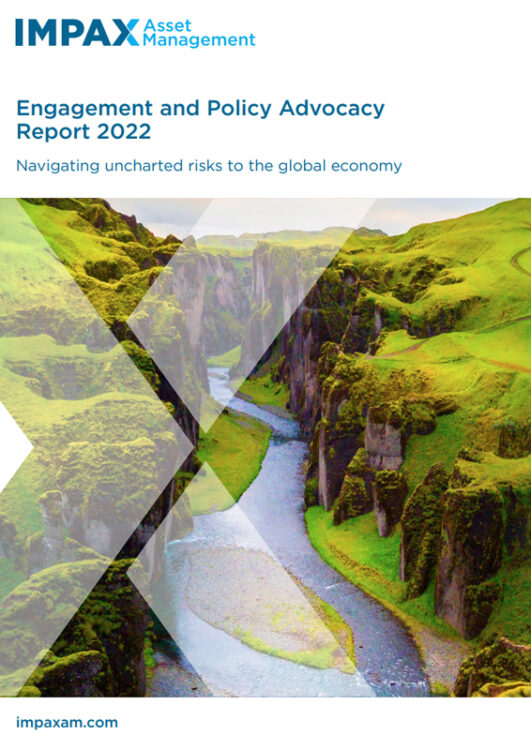A Q&A with Vice President, Lead Sustainability Research Analyst Heather Smith
Q: You have been talking with companies about the importance of equality and diversity for years. The events of 2020 cast a spotlight on these topics. How did you see companies react?

Heather Smith: It became clear early on that companies were paying attention, and they were certainly more vocal about commitments to diversity inclusive of gender, race and ethnicity, perhaps more so than they have been in the past. A good example is around EEO-1 data, that is, employee demographic data that the US Equal Employment Opportunity Commission requires companies to submit annually. We saw a lot of big companies disclose or commit to disclose their EEO-1 data. This is something we and other investors have encouraged companies to do for many years — increase transparency around what their workforce looks like. The EEO-1 form provides a standardized way for them to do this, but companies are not required to make the form publicly available, and most do not voluntarily disclose it.
In 2020, we and other investors increased calls to companies asking them to disclose their EEO-1 data. During the course of dialogue and outreach, several companies, including Disney, Biogen and Best Buy told us they were committed to disclosing their EEO-1 data this year.
Q. That is good progress. Why is disclosure of EEO-1 data important to investors?
Heather Smith: The employee demographic data provides a baseline, a starting point that will show over time how a company is progressing toward its goals to diversify the workplace. Diversifying the workplace is important for two primary reasons: First, hiring and developing more women and racial minorities, from entry level to company leadership, helps level the playing field, helps bring about a more equitable society. Also, a multitude of research has
shown that more diverse workplaces tend to outperform less diverse workplaces, so companies that are more diverse tend to be better investments.
Q: Why do you think companies have been reluctant to proactively disclose EEO-I data and, aside from investor pressure, what do you think has inspired big companies like Biogen and Best Buy and Disney to change?
Heather Smith: Companies generally do not want to release data that does not look great, but I think increasingly they are realizing the reputational benefits of proactively addressing workplace diversity. We saw this happen as companies began disclosing pay equity data a few years back. Companies earned respect when they came out and said ‘We ran an analysis and found a pay gap and here is what we are doing to close it.’ Stakeholders were responsive to the fact they admitted they had an issue with equal pay but were working to address it. I think many companies have come to that realization with the demographic data. Also, we are at a point where companies cannot just come out and make big pronouncements about race and gender and diversity and then not have any data to back those statements up or any way of indicating that progress is being made. Transparency helps hold them accountable to their promises. It gives them a reason to do better, and that is something that investors and other stakeholders are interested in — accountability and progress.
“We are at a point where companies cannot just come out and make big pronouncements about race and gender and diversity and then not have any data to back those statements up.”
Q: Tell us about a 2020 engagement on the topic of pay equity.
Heather Smith: Early in 2020 we reached out to PNC Financial to request a dialogue about pay equity. They were responsive and we scheduled a meeting. During the conversation, we learned about the steps they were taking to address pay equity and we encouraged them to disclose both their pay equity data and their commitment to pay equity. The company published that data for the first time when it released its sustainability update in the fall.
Q: This seems like an important milestone. At a time when other companies may have been pulling back from non-pandemic-related initiatives, they kept their finger to the pulse
Heather Smith: Yes, it indicated that PNC was still engaged on other important issues even at a time when resources may have been constrained. Wage equity is not something that we can pay attention to only when we are not in a crisis, particularly when a crisis is exacerbating pay and wealth gaps for women and people of ethnic and racial minority groups, as this one was. The fact that PNC considered our feedback and upped their disclosure even amid a crisis underscored their focus and commitment to diversity and inclusion.
Q: What about board diversity?
Heather Smith: Every company was redirected in some way because of the crises of 2020, but we still had a number of successful engagements about diversity-related issues. CatchMark Timber Trust is one example. We talked with them about board diversity and they pretty quickly formalized and publicly disclosed their policy in response to that conversation.
Q: Based on your engagements In 2020, what makes you hopeful going into the months ahead?
Heather Smith: Because the pandemic has gone so long and because, unfortunately, high-profile examples of ethnic and racial bias continue to dominate the headlines, there is continuing pressure on companies to get things right. I am hopeful that from that we will start to see more meaningful change.
We have long known that there are biases built into our societal system, that the system has been stacked against women and people of ethnic and racial minority groups for a long time, but 2020 really laid bare how inequality affects the lives of people in so many ways. That cannot be unseen, nor should it be.
Many more investors are now interested in racial justice, environmental justice, gender and racial equality and are taking action on these issues through proxy votes and their own engagements. At the same time, customers have higher expectations of companies, particularly consumer-facing companies. I am hopeful that the increase in statements and high-level commitments that we saw in 2020 will translate into tangible action this year — that companies will publish disclosures or metrics or other indications that the promises they made in the immediate aftermath of 2020’s unfortunate events will be a long-term focus.

As of 06/30/2021, Biogen Inc. was not held in any Pax World Funds; PNC Financial Services Group, Inc. 3.45% 04/23/2029 was 0.1% of the Pax Core Bond Fund; PNC Financial Services Group, Inc. was 0.3% of the Pax Ellevate Global Women’s Leadership Fund and 0.1% of the Pax US Sustainable Infrastructure Fund; CatchMark Timber Trust, Inc. was 1.8% of the Pax Small Cap Fund and 0.1% of the Pax Sustainable Allocation Fund; Best Buy Co. Inc. was 0.6% of the Pax US Sustainable Economy Fund, 0.9% of the Pax Ellevate Global Women’s Leadership Fund, and 0% (less than 0.05%) of the Pax Sustainable Economy Fund; The Walt Disney Company was 0.3% of the Pax Core Bond Fund, 0.1% of the Pax Sustainable Allocation Fund and 1.1% of the Pax Ellevate Global Women’s Leadership Fund. Holdings are subject to change.
Risks: Investments involve risk, including potential loss of principal. Equity investments are subject to market fluctuations, the fund’s share price can fall because of weakness in the broad market, a particular industry, or specific holdings.
IMPX-0486

 United States
United States